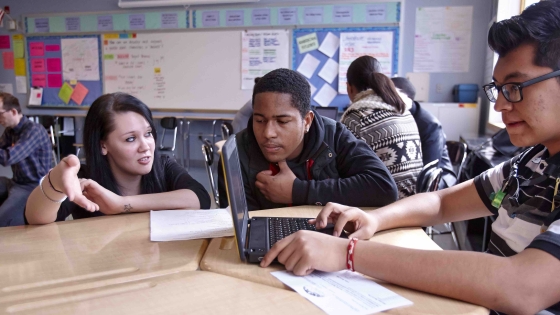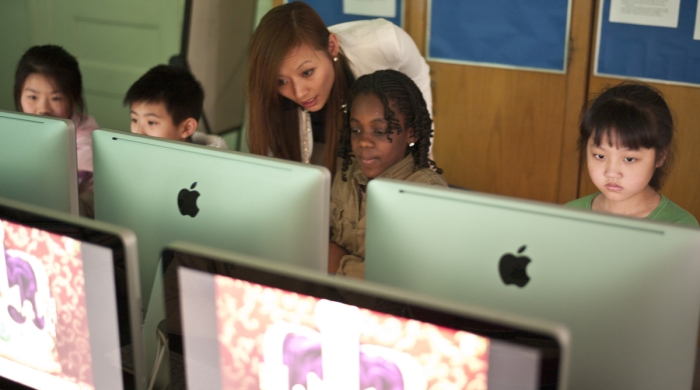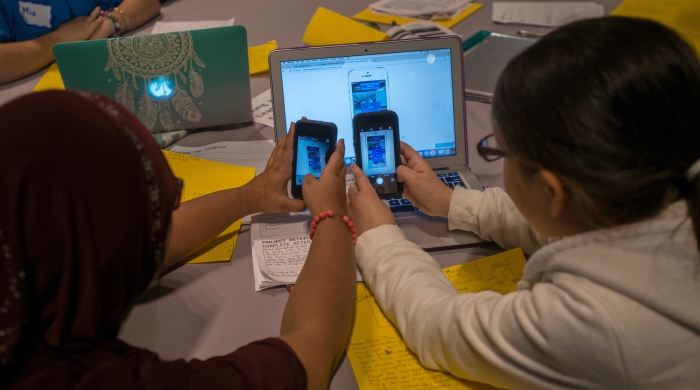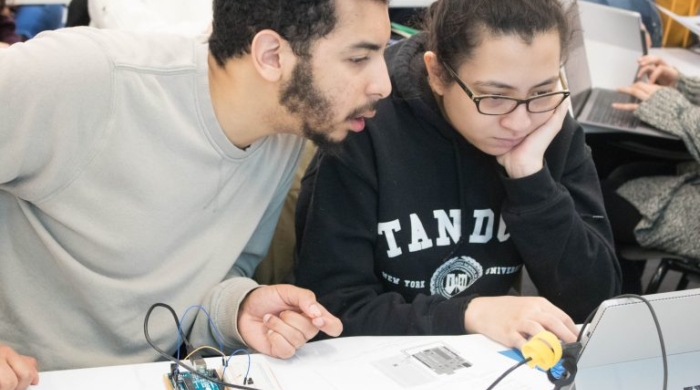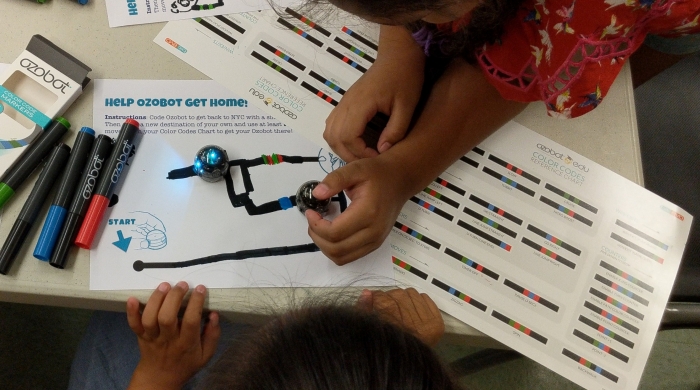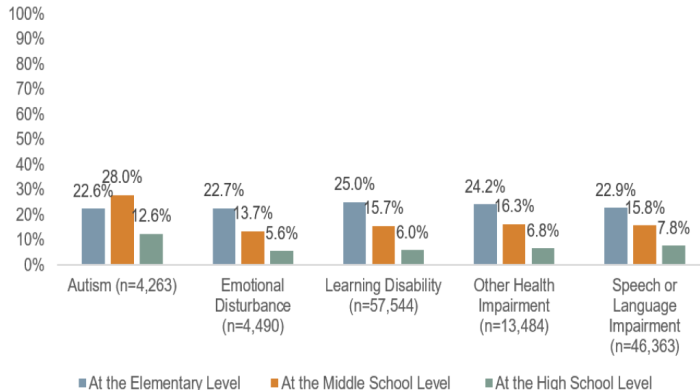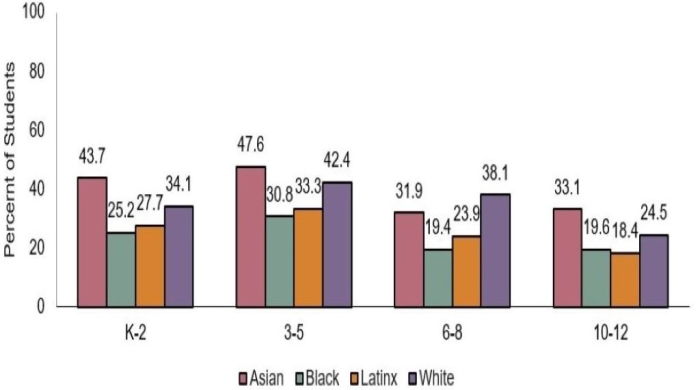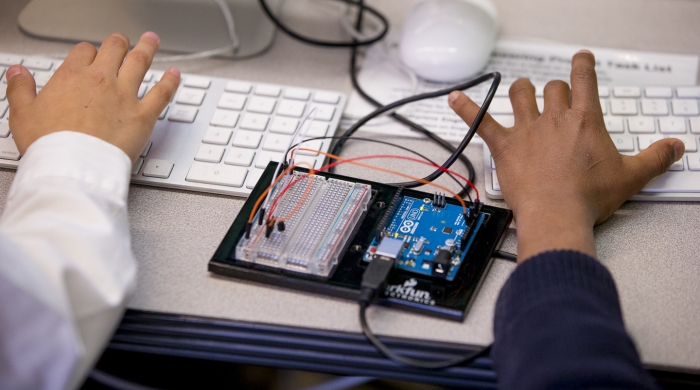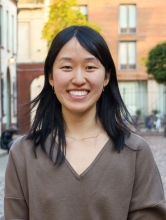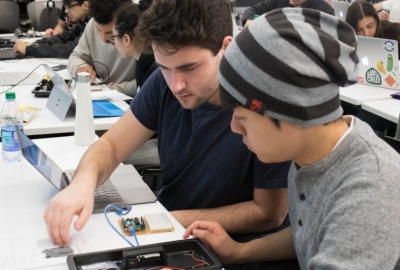
About Computer Science for All (CS4All)
CS4All is a 10-year, $81 million public-private partnership between the City of New York and the private sector, designed to bring computer science education to every student in NYC public schools. Early in 2016, President Obama announced a similar nationwide push to expand computer science education and position students for success in our technology-driven world.
NYC’s initiative aspires to give students meaningful computer science (CS) experiences, building on prior exposure and skills, in all three grade levels: elementary, middle, and high school. To facilitate these learning experiences, a key component of CS4All is the scaling up of computer-science-focused professional development to nearly 5,000 teachers throughout the system.
CS4All aims to equip the City’s students to be active creators of technology rather than merely consumers, thus preparing more students for the technology workforce. This includes an emphasis on computational thinking and problem solving abilities—widely applicable skills that are important for a range of careers. CS4All’s goal is to ensure access to high-quality computer science education for all NYC students.
About Our Evaluation
In 2016, the CS4All Founders Committee—which includes representatives from the New York City Department of Education, City Hall, the Fund for Public Schools, CSNYC, the Robin Hood Foundation, the Robin Hood Education and Technology Fund, and Math for America (MƒA)—selected the Research Alliance to evaluate the initiative, in collaboration with Education Development Center (EDC).
The nine-year evaluation will answer important questions about the implementation and impact of CS4All for NYC students, schools, and teachers. The study will examine how the initiative is being rolled out in schools across the City, as well as how professional development is being organized, how it is being accessed by teachers, and how it is shaping their classroom practices.
We will also measure short- and long-term student outcomes, including computer science knowledge and skills, as well as other measures of academic achievement, engagement, and non-cognitive outcomes, such as students’ sense of belonging and their awareness of computing careers and applications. The evaluation will focus on understanding how CS4All affects different groups of students, particularly those who are typically underrepresented in computer science and other STEM fields (e.g., girls and Black and Latino students). Research methods will include interviews, surveys, and document reviews, along with analyses of teachers’ participation in professional development and data on students’ characteristics, course taking, and outcomes.
Lessons learned from the evaluation will support the ongoing implementation of CS4All in NYC, and provide knowledge to help inform similar efforts in other cities.
This study is funded through the Fund for Public Schools.
Related Projects and Publications
Evaluating the Outcomes of Students Taking Computer Science in NYC Schools
This report examines short- and longer-term outcomes associated with CS course-taking, including students' attitudes, computational thinking skills, academic achievement, continued CS engagement, and postsecondary pathways.
Building School Capacity to Scale Up Computer Science Participation
This report explores school-level capacity building that was part of the CS4All initiative. The analyses highlight key factors that shaped schools’ ability to implement and sustain CS—including the importance of a strong CS culture, common planning time, and strategic alignment with other instructional priorities.
Building Teacher Capacity for Equitable Computer Science Education
Central to New York City’s Computer Science for All (CS4All) initiative was an ambitious effort to build teacher capacity to deliver high-quality CS instruction across NYC schools. This report examines teachers’ participation and experiences in CS4All professional learning, their subsequent implementation of CS in the classroom, and factors that influenced their capacity to offer CS to their students.
Expanding Computer Science Education for All
New York City’s CS4All initiative, launched in 2015, significantly expanded access to computer science (CS) education, tripling the number of participating schools and reaching nearly 170,000 students annually. This new Research Alliance report examines the initiative’s successes, as well as ongoing challenges, and highlights the need for continued efforts to ensure high-quality CS learning opportunities for all students.
Urban Institute Essay: Moving the Needle on Equity in Computer Science Education
The Research Alliance's Cheri Fancsali and Janice Lee published this essay as part of the Urban Institute's Learning Curve series. The essay highlights findings from our CS4All evaluation and considers implications for CS education policy and practice.
CS4All: Examining Equity
As part of the Research Alliance’s ongoing evaluation of CS4All, this report examines progress toward the initiative’s goals, including the extent to which schools are reaching all of their students with CS, as well as the extent to which participation is equitable for girls and Black and Latinx students—who have been starkly underrepresented in CS education and careers.
Beyond Access and Participation in CS for All
This study will develop and test measures of culturally responsive-sustaining education (CR-SE) in computer science—providing vital tools and evidence to inform the growing CS education field.
Examining and Addressing Barriers that Hinder Schools’ Progress Toward CS for All
This study will foster a better understanding of the challenges faced by schools that are lagging behind in providing computer science education to all of their students, and identify supports and strategies to help them make progress.
The Potential of CR-SE for K-12 Computer Science Education
This interview examines the close connection between equity and computer science, and Culturally Responsive-Sustaining Education. The conversation provides insights into how leaders in computer science enact CR-SE practices in their work.
To What Extent Are Students With Disabilities Included in K-12 Computer Science Education?
This Spotlight post uses data on students’ Individualized Education Plans and course enrollment records from the 2018-2019 school year to explore the degree to which students with disabilities are participating in CS.
Who is Taking Computer Science in New York City Schools?
This Spotlight post uses data from the 2016-2017 through 2018-2019 school years to explore NYC students’ participation in CS across grade bands. We focus here on differences associated with race and ethnicity, gender, and socioeconomic status.
Computer Science in New York City
This report includes a summary of CS4All’s key goals and strategies; a broad look at CS education and training in the City (including programs that are the result of CS4All’s first two years of implementation, as well as preexisting efforts); an exploration of teachers’ responses to CS4All PD; and considerations for the ongoing development of the initiative. (2018)
Journal Articles
Hill, K., Flores, M., Fancsali, C., and Ryoo, J. (2025, July). CR-SE in Practice: Using the Power On! Graphic Novel to Facilitate Culturally Responsive CS Instruction. In Proceedings of the 2025 Conference on Research on Equitable and Sustained Participation in Engineering, Computing, and Technology (RESPECT 2025). Association for Computing Machinery, New York, NY, USA, 138–146.
Wildbill, S., Fancsali, C., Hill, K., and Adair, A. (2025, July). Educator's Implementation and Understanding of Translanguaging and Universal Design for Learning in Teaching Culturally Responsive Computer Science Education. In Proceedings of the 2025 Conference on Research on Equitable and Sustained Participation in Engineering, Computing, and Technology (RESPECT 2025). Association for Computing Machinery, New York, NY, USA, 343–347.
Villavicencio, A., Martin, W., Fancsali, C., & Israel, M. (2024, October). Examining two different models for developing teachers new to computer science: lessons from a CS4All district. Journal of Research on Technology in Education, 1–22.
Mirakhur, Z., Fancsali, C., Hill, K. (2023, October). Outsiders Within: How Do Black Girls Fit Into Computer Science For All? In Associations for Computing Machinery Transactions on Computing Education (ACM TOCE).
Lee, J., Fancsali, C., Clough, S. (2023, March). Reaching For All: Understanding the Challenges and Needs of Schools Lagging in CS for All Efforts. In 2023 Research on Equity and Sustained Participation in Engineering, Computing, and Technology (RESPECT). IEEE.
Mark, J., Fancsali, C., Lee, J., Li, X., Jain, R., Crawford, C. (2023, March). "Getting My Feet Wet and Starting Small": Building Capacity for Culturally Responsive Computer Science. In 2023 Research on Equity and Sustained Participation in Engineering, Computing, and Technology (RESPECT). IEEE.
Hill, K., Rivera-Cash, E., Tavlin, M. (2023, March). Ramping Up to CS for All: Broadening Participation Through Equity-Focused Leadership. In 2023 Research on Equity and Sustained Participation in Engineering, Computing, and Technology (RESPECT). IEEE.
Hill, K., & Fancsali, C. (2021, March). Bridging Professional Development to Practice: Using School Support Visits to Build Teacher Confidence in Delivering Equitable CS Instruction. In Proceedings of the 52nd ACM Technical Symposium on Computer Science Education (pp. 725-731).
Fancsali, C., Mark, J., & DeLyser, L. A. (2020, March). NYC CS4All: An Early Look at Teacher Implementation in One Districtwide Initiative. In 2020 Research on Equity and Sustained Participation in Engineering, Computing, and Technology (RESPECT) (Vol. 1, pp. 1-8). IEEE.
Fancsali, C., Tigani, L., Toro Isaza, P., & Cole, R. (2018, February). A landscape study of computer science education in NYC: Early findings and implications for policy and practice. In Proceedings of the 49th ACM Technical Symposium on Computer Science Education (pp. 44-49).

